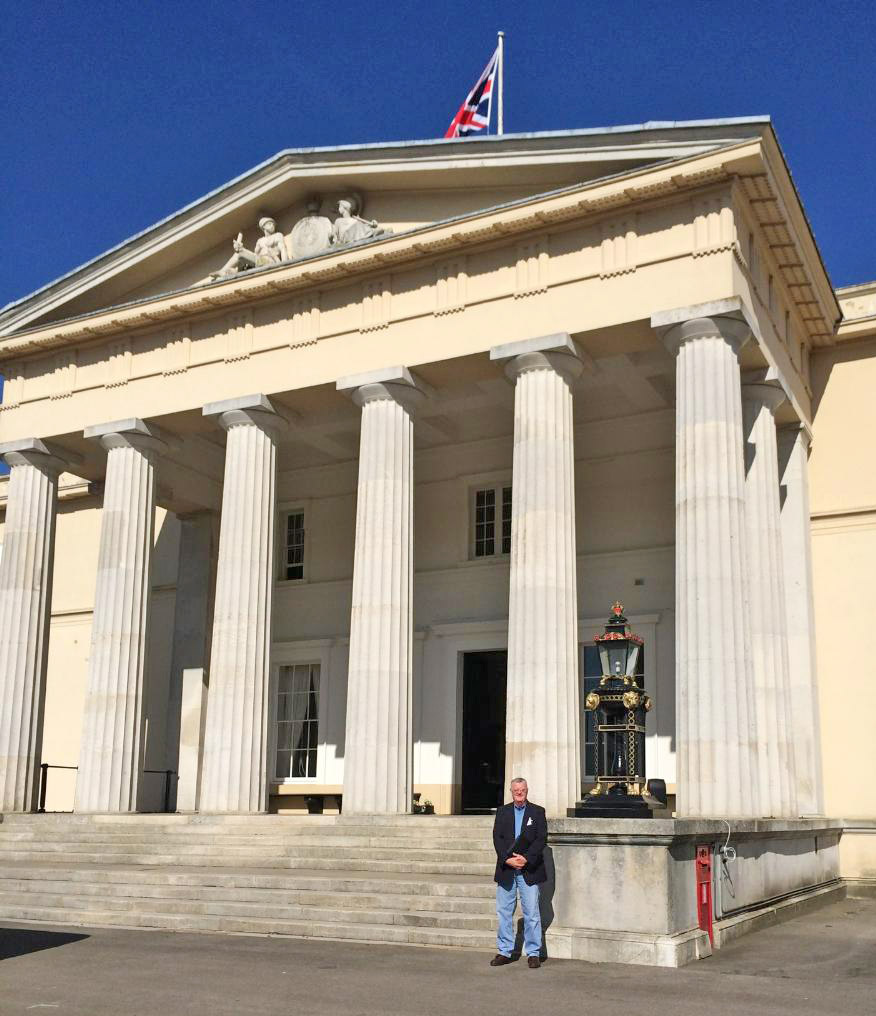
From April 14-17, 2014 I had the unique opportunity of attending an international history conference in England entitled “1944: Seventy Years On.”
Sponsors included Global War Studies: The Journal for the Study of Warfare and Weapons, 11919-1945 together with the National Intelligence University and the United States Holocaust Memorial Museum, both located in Washington, DC.
The conference was held at the Royal Military Academy Sandhurst, the legendary military school, where thousands of young Englishmen including such famous figures as Bernard Montgomery, Winston Churchill and more recently Prince Harry had trained as junior officers since the Napoleonic Era.
Our living accommodations varied. Most of the delegates, which numbered about a hundred and fifty, stayed at local hotels in Camberly, the village just outside main gate.
Those of us who applied early had the rare opportunity of staying on the Sandhurst campus. Some lived at Victory College while others, like myself, were housed in the “Slim Annex” (opened in 2004) named for Field Marshall William Slim, a thrice wounded veteran of the First World War who commanded troops in East Africa, the Middle East and the Burma Campaign during the Second World War.
Great Britain’s infamous rainy, soggy spring weather never appeared. Instead we all enjoyed a week of cloudless days of brilliant sunshine and cool evenings which continually freshened our spirits while revealing the Sandhurst campus in all its majesty.
The conference agenda partnering with the weather offered everyone the delight of moving back and forth between panels held at the venerable Old College and formal lectures at Woolwich Hall opposite the Royal Military Chapel.
You’ll quickly note from a read of the conference program that the panels were generally Euro-centric in nature. Given the pivotal nature of 1944 and the upcoming seventieth anniversary of the Normandy Invasion this only makes sense.
What was encouraging was that about a third of the panels examined the previously under-examined war in the Pacific or as some called it the Asian War. The Asian experts included both Americans and a small handful of Japanese scholars as well. Curiously, however, there were no scholars in attendance from the Peoples Republic of China, Taiwan or Russia.
Another interesting feature was the interest in intelligence and counterintelligence issues – what Christopher Andrew calls the “handmaiden of policy.”
I was fortunate enough to chair one of these panels.
Standing in the magnificent Indian Army Room it was a privilege to introduce my group which included Dr. James Perry, an executive with the Northrup-Grumman Corp. in Washington, DC who pursues a passion for history as an independent scholar in his spare time.
Next was Dr. Klaus Schmider, a professor of history at Sandhurst and Dr. Jill Edwards, a historian at the American University at Cairo, Egypt whose paper entitled “Cairo Spies: Problems of Intelligence Appraisal in Early Post-War Planning” was of particular interest to me.
Because historians generally conduct their work alone in dusty archives and libraries conferences such as these offer the chance to meet colleagues who share similar interests.
This conference was particularly useful for me when three excellent historians studying different aspects of German foreign intelligence operations during the Second World War confirmed conclusions in my new book Hoover’s Secret War. A gratifying payoff and an excellent conference experience.
1944 Seventy Years On Conference Programme (.pdf)
Photo Gallery:
Click on image to enlarge and read caption.



















You must be logged in to post a comment.